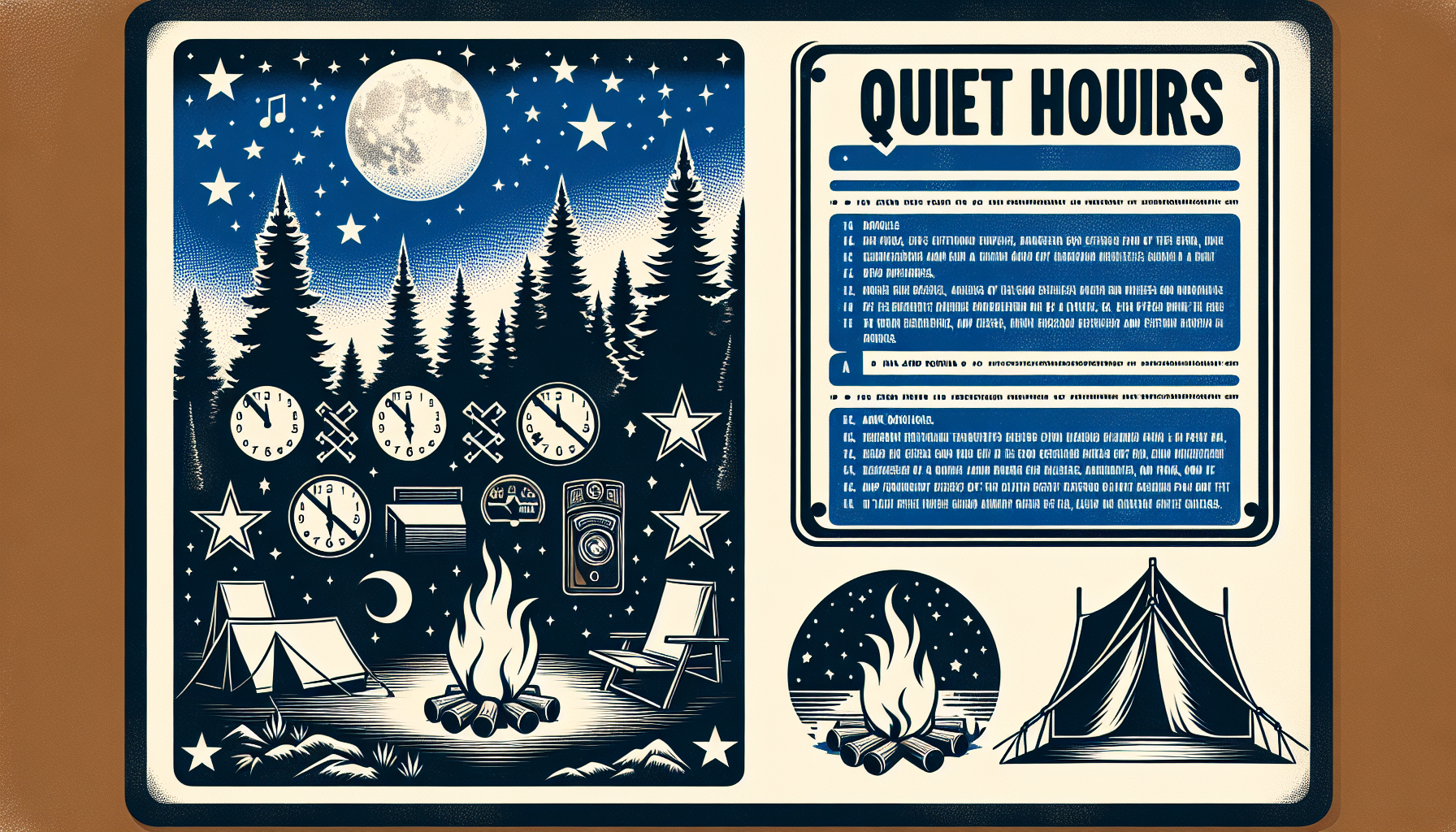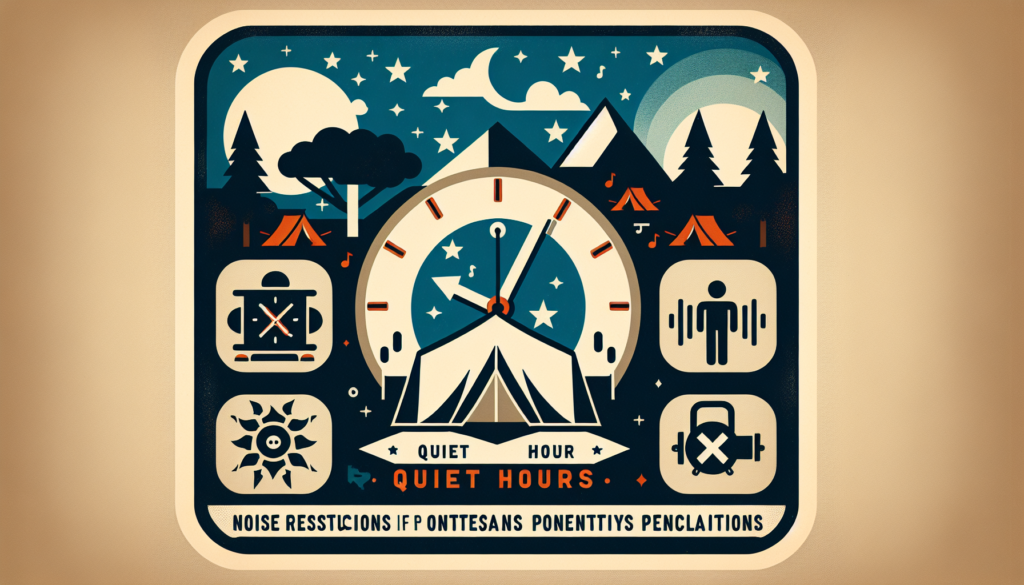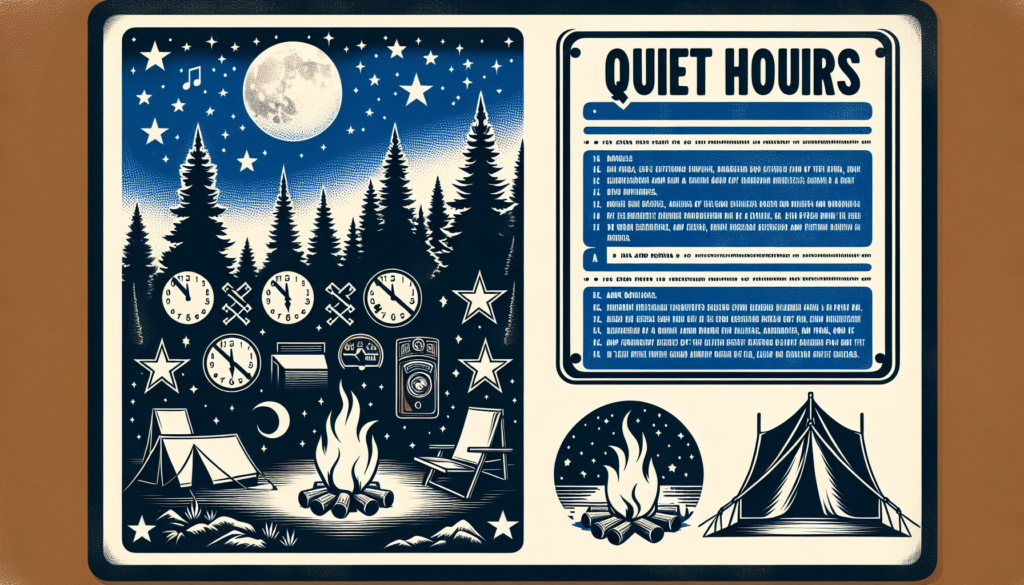
In this article, we explore the fascinating world of campsite quiet hours in Texas. As outdoor enthusiasts, we understand the importance of finding tranquility in nature, but it’s also crucial to respect the rules set in place for the wellbeing of all campers. So, if you’re planning a camping trip to the Lone Star State and wondering about the policy on campsite quiet hours, you’ve come to the right place! We will shed light on the regulations and guidelines that govern this aspect of camping in Texas, ensuring a peaceful and enjoyable experience for everyone.

Overview of Campsite Quiet Hours in Texas
Campsite quiet hours refer to designated periods of time when campers are expected to limit noise and maintain a peaceful environment within the campgrounds. These quiet hours are established to ensure that everyone can enjoy a good night’s rest and have a pleasant camping experience. In Texas, campsite quiet hours are regulated by both state and local authorities to uphold the well-being and comfort of all campers.
Definition of Campsite Quiet Hours
Campsite quiet hours typically start in the evening and extend until the early morning hours. During these designated times, campers are expected to reduce noise levels and refrain from causing any disturbance that may disrupt the tranquility of the camping area. This includes activities such as loud conversations, music, generators, and any other noise-producing activities that may disturb fellow campers.
Importance of Campsite Quiet Hours
Campsite quiet hours play a crucial role in maintaining a peaceful and respectful camping environment. They ensure that campers can enjoy a restful night’s sleep, allowing them to recharge and fully embrace their outdoor experiences. By minimizing noise during quiet hours, campers have the opportunity to connect with nature, unwind from their daily routines, and appreciate the serene beauty of the campsite surroundings.
Enforcement of Campsite Quiet Hours
To ensure compliance with campsite quiet hours, enforcement measures are put in place by the relevant authorities. Campsite hosts, rangers, and local law enforcement agencies work together to monitor and enforce these regulations. They may patrol the campgrounds during quiet hours and respond to noise complaints from other campers. It is important for campers to be aware of the rules and regulations regarding quiet hours to avoid any potential consequences for non-compliance.
Understanding the Regulations
Campsite quiet hours in Texas are governed by both state and local regulations. It is essential for campers to familiarize themselves with these regulations to ensure they can enjoy their camping experience while respecting the needs and comfort of others.
State Regulations on Campsite Quiet Hours
The Texas Health and Safety Code, Title 3, Chapter 366, outlines the state regulations regarding campsite quiet hours. This code establishes the scope and objective of maintaining peaceful camping environments and provides specific guidelines for campers to follow.
Texas Health and Safety Code, Title 3, Chapter 366
The Texas Health and Safety Code, Title 3, Chapter 366, aims to preserve the peace and well-being of individuals residing in or visiting camping areas. It defines quiet hours as the designated period during which campers must limit noise and refrain from engaging in disruptive activities that may disturb others.
Prohibitions during quiet hours include amplified music or sound, excessive noise from vehicles or equipment, loud or unruly behavior, and any disturbance that interferes with the peaceful enjoyment of the campsite. These regulations apply to both private and public campgrounds throughout the state of Texas.
However, the code also outlines certain exceptions to quiet hours. These exceptions may include emergency situations, official campsite events, or activities that have been pre-approved by the relevant authorities. It is crucial for campers to understand these exceptions and ensure they are in compliance with the code’s guidelines.
Quiet Hours Guidelines by Texas Parks and Wildlife Department
The Texas Parks and Wildlife Department provides additional guidelines relating to quiet hours in campgrounds. These guidelines emphasize the importance of maintaining a peaceful atmosphere and the role of campsite hosts and rangers in enforcing the regulations.
Importance of the Guidelines
The guidelines set forth by the Texas Parks and Wildlife Department build upon the state regulations to further facilitate a positive camping experience for all visitors. They highlight the significance of proper behavior and respect towards fellow campers during quiet hours.
Specifics on Quiet Hours
The guidelines specify the duration of quiet hours, typically starting around 10:00 PM and concluding in the early morning hours, ensuring a sufficient period of undisturbed rest for campers. Additionally, these guidelines outline the types of activities that should be avoided during quiet hours, such as excessively loud conversations, music, or other noise-producing activities.
Role of Campsite Hosts and Rangers
Campsite hosts and park rangers play a vital role in ensuring compliance with quiet hour regulations. They monitor the campground, respond to noise complaints, and educate campers about the importance of maintaining a peaceful environment. Campers are encouraged to cooperate with these officials and follow their instructions to contribute to a more enjoyable camping experience for all.
Local Regulations on Campsite Quiet Hours
In addition to state regulations, local authorities may have their own specific regulations governing campsite quiet hours. These regulations may vary depending on the jurisdiction and the specific campsite being visited.

Jurisdiction of Local Authorities
Local authorities, such as county or city governments, may establish their own regulations regarding campsite quiet hours. These regulations often work in conjunction with the state regulations, ensuring a comprehensive and consistent approach to maintaining peaceful campgrounds. Campers should familiarize themselves with any local regulations that may apply to their chosen campsite.
Differences in Quiet Hour Policies
While state regulations provide a baseline for quiet hour policies, it is important to recognize that variations may exist among different campgrounds and parks. Each campsite may impose its own specific guidelines and restrictions on noise and activity during quiet hours. Therefore, it is recommended that campers research and familiarize themselves with the specific policies of their desired campsite before their arrival.
Variation Across Campsites
Campsite policies regarding quiet hours can vary significantly, even within the same region or state. Different campgrounds may have unique rules and guidelines, all aimed at maintaining a peaceful camping experience for their visitors.
Diversity in Campsite Rules
Campsite rules regarding quiet hours may differ based on factors such as location, size, amenities, and target audience. Some campgrounds may have more lenient quiet hour policies, allowing for late-night gatherings and activities, while others may implement strict regulations to ensure absolute tranquility during designated quiet hours. It is essential for campers to understand and respect the specific rules of their chosen campsite.
Researching Campsite Policies before Arrival
To avoid any unexpected surprises or non-compliance with campsite quiet hour policies, it is highly recommended that campers thoroughly research and familiarize themselves with the policies and regulations of their intended campsite before their arrival. This can be done by visiting the campsite’s official website, contacting campsite management directly, or referring to reliable camping resources.
Ensuring Compliance with Campsite Quiet Hours
To ensure a harmonious camping experience for all, it is crucial for campers to adhere to campsite quiet hour policies. By following a few simple tips, campers can contribute to a peaceful atmosphere within the campgrounds.
Tips for Campers to Follow Quiet Hour Policies
- Respect the designated quiet hours and keep noise levels to a minimum during these periods.
- Avoid engaging in activities that may produce excessive noise, such as playing loud music or using generators.
- Be mindful of your conversations and keep voices low, especially during late-night hours.
- Utilize headphones or earphones for personal entertainment to avoid disturbing others.
- Educate fellow campers about the importance of quiet hours and encourage respectful behavior.
Consequences of Violating Quiet Hour Policies
Non-compliance with campsite quiet hour policies can result in consequences and impact not only one’s own camping experience but also the experiences of others. Campers who violate these policies may face warnings from campsite officials, eviction from the campgrounds, or other disciplinary actions. It is essential for campers to understand the potential repercussions and respect the rules in place.
Balancing Enjoyment and Respect
Maintaining campsite quiet hours is not just a matter of following rules; it is also about fostering a sense of respect and consideration for fellow campers. By striking a balance between enjoyment and respect, everyone can have a memorable and enjoyable camping experience.
Importance of Respectful Behavior
Respectful behavior within campgrounds is vital for ensuring a positive atmosphere and preserving the tranquility of natural surroundings. By being mindful of noise levels and considering the impact of their actions, campers can create a welcoming environment where everyone can relax and enjoy their time in nature.
Benefits of Maintaining Quiet Hours for All Campers
Maintaining campsite quiet hours benefits all campers by providing an opportunity for a peaceful night’s sleep and a chance to connect with nature. It allows campers to fully appreciate the serenity of the campsite, immerse themselves in the sounds of wildlife, and wake up refreshed for a new day of outdoor adventures.
Conclusion
Campsite quiet hours are essential for preserving the tranquility and well-being of campers in Texas. State and local regulations, as well as campsite guidelines, establish the rules and expectations regarding quiet hours. By understanding and respecting these regulations, campers can contribute to a more enjoyable and harmonious camping experience for all. Remember, quiet hours are not just about following rules but about demonstrating respect and consideration for fellow campers, fostering a welcoming environment, and savoring the unique joys of camping in the great outdoors.